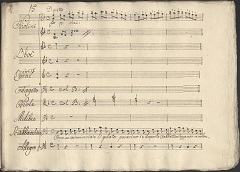Animal of the Year 2022: Donkey
Thursday, August 11, 2022

As in previous years, various organizations have made selections for a plant or animal “of the year” for 2022. The German environmental organization NABU has a good overview. Apart from this list, the non-profit organization Bündnis Mensch & Tier has picked the donkey as the domestic animal of the year.
Donkeys have a reputation for being stubborn, sometimes even dumb, and the word is often used as an insult. And as you might expect, these good-natured, attentive, and calm animals can also be found in the RISM catalog in various languages: Esel, donkey, l’asino, l’âne, osioł.
In German, the Esel (RISM Catalog|RISM Online) has a fixed place in numerous songs, especially children’s songs. But film music by Martin Böttcher (1927-2019) from the German movie 13 kleine Esel und der Sonnenhof (RISM Catalog|RISM Online) from 1958 has found its way into the database.
To find donkeys in French, in the RISM Catalog you can do an Advanced search for âne in All Fields and select Language, then enter French. In RISM Online you can search for âne on the Sources page and then under Source contents you can select French under Language of text.
A Polish version can be found in the Christmas song “O bożym narodzeniu” by Józef Stefani (1800-1876) (RISM Catalog|RISM Online) with the words “Wół ryczy osioł krzyczy wrona skrzeczy baranek beczy” (The ox lows, the donkey brays, the crow caws, the lamb bleats).
Among the English-language versions (RISM Catalog|RISM Online), one record stands out. Who know the dance steps to the Donkey waltz (RISM ID no. 125415; RISM Catalog|RISM Online)?
In Italian-language musical sources, the donkey (RISM Catalog|RISM Online) can be found in many operatic settings. Take, as an example, a two-act opera by Valentino Fioravanti (1764-1837) that is completely unknown today, Il Ciabattino incivilito (RISM Catalog|RISM Online). In scene 6 of the second act (see incipit 1.37.1), there is a duet between Melibeo and Sciabacchino, who vent about the poor shoemaker who lacks will (“Come un asino è restato li gelato poverino s’è scoperto ciabattino senza averne volontà”).
Image: Valentino Fioravanti, duet “Come un asino è restato li gelato” from the opera Il Ciabattino incivilito, Sächsische Landesbibliothek - Staats- und Universitätsbibliothek (D-Dl) Mus.4112-F-503. RISM ID no. 270001503 (RISM Catalog|RISM Online). Available online (Public Domain Mark 1.0).
Share Tweet EmailCatégorie: A la une

